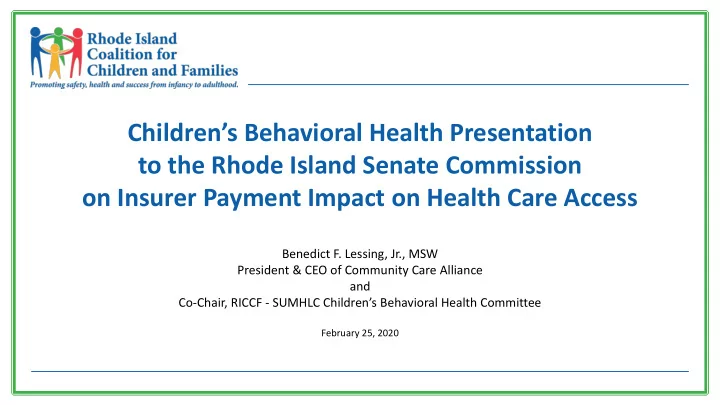

Children’s Behavioral Health Presentation to the Rhode Island Senate Commission on Insurer Payment Impact on Health Care Access Benedict F. Lessing, Jr., MSW President & CEO of Community Care Alliance and Co-Chair, RICCF - SUMHLC Children’s Behavioral Health Committee February 25, 2020
• Mental health problems affect children of all backgrounds. Nationally, 10% of children under age five experience a significant mental health issue. In Rhode Island, one in five (19.0%) children ages six to 17 has a diagnosable mental health problem; one in ten (9.8%) has significant functional impairment (2019 Children’s RI KIDS COUNT Fact Book, pg. 58) • According to the RI Kids Count 2019 Factbook, in 2017, there were 3,168 emergency department visits and 2,458 hospitalizations of Rhode Island children with a primary diagnosis of mental disorder. Between 2007 and 2017, Behavioral emergency department visits increased 18% and hospitalizations increased 37% (2019 RI KIDS COUNT Fact Book, pg. 59) • An EOHHS analysis of Medicaid and APCD claims data identified a cohort of Health: children and youth under 22 years who visited an Emergency Department or had an Inpatient Stay in Calendar 2017 and tracked their engagement over a 24- month period (Youth Behavioral Health Presentation by EOHHS to CBH Overview Committee, December 2019) • Emergency Department visits: 2612 children and youth ages 0-21 years • 47.9% male, 52.1% femaie, 475 were high utilizers (visited 4+ times between Jan 2016-December 2018) • 1.8% matched to DCYF placement data • Inpatient stays: 1351 children and youth age 0-21 • 47.7% male, 52.3% female, 629 were high utilizers (hospitalized 3+ times between January 2016-December 2018) • 3.1% DCYF matched to DCYF placement data
• Lack of comprehensive planning and data for all children with behavioral health needs. • Lack of safety net programs within the continuum of children’s services. A major gap in Intensive Community-Based Treatment (ICBT) is Children’s believed to be driving children and youth to inpatient care and/or lengthening stays. Behavioral • Rates inadequate to cover costs are threatening program viability and exacerbating workforce challenges. Private community-based Health Issues organizations cannot continue to subsidize the base costs of services. • Children’s behavioral health treatment is now insurer-driven not actually part driven by the DCYF budget.
• There is no comprehensive planning and data authority for children and youth with behavioral health issues. • The statutory responsibility for children with Serious Emotional Disturbance Children’s (SED) whose disability will last one year or more is under the RI Department of Children and Youth Families (RI GL 42- Behavioral 72-5). DCYF responsibility and services are focused on youth who have had Health Planning interactions with DCYF and/or Family Court and Data • BHDDH licenses children’s mental health facilities and oversees adolescent substance use services. The Departments of Health and Education also have roles in CBH.
Critical Gap in Current Safety Net: ICBT Enhanced GAP: Outpatient Intensive Inpatient Services (in- Community- Psychiatric home Based Treatment Care component) (ICBT) Outpatient Services Intended to be short-term GAP: Intensive, in-home treatment up to 18 months Impacted by lack of ICBT
• Community Care Alliance: • Last year served 820 children and youth in Outpatient and 290 in home- based Enhanced Outpatient Services(EOS) with an average of 10-12 intakes per week. • Total program budget for Enhanced Outpatient was $1.14M, and there was a gap between payments and costs of $302,878. • The total program budget for regular Outpatient was $632,000. The gap between payments and costs was $108, 583. Gap between • Thrive Behavioral Health: • The Enhanced Outpatient Service (EOS) is serving approximately 110 children and youth per month or approximately 220 per year. This last Payments and month, 4253 units of service (equals one or multiple contacts with a single child in a given day) were provided. • The cost per unit is $23.14. Reimbursement is $19.31 loss is $3.83 per unit. The projected loss is $16,288/mth or $195,467 Costs per year. • Family Service Rhode Island: • Family Services also provides Outpatient and Enhanced Outpatient services. The programs served a combined total of 574 children and youth. • The Enhanced Outpatient Services program has a payment gap of up to $388.46/day or $141,000 per year. • The Outpatient program has a gap of $274.40/day or $100,156 without client cancellations.
• Rhode Island urgently needs a comprehensive review of and a plan to systematically address behavioral health issues for all of the state’s children and youth. Recommendations: • Rhode Island needs to ensure that outpatient and intensive community-based treatment services are adequate to meet the needs of children and youth and cover the costs of providers. Private community- based charitable organizations cannot continue to subsidize the base costs of services.
Recommend
More recommend